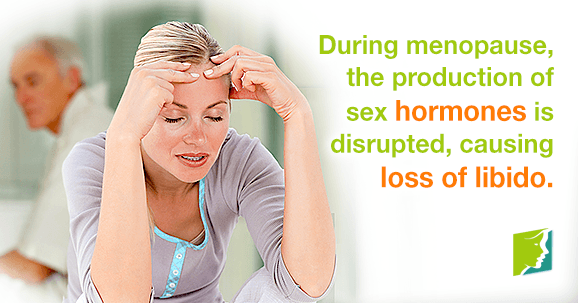Are you approaching menopause and worried about losing your sex drive? Or, maybe you are already suffering from a low libido and eager to find an effective treatment. Menopause, an inevitable part of a every woman's life, can have a huge impact on your body. There are 34 symptoms of menopause, and loss of libido is just one. Read on and find out more about the relationship between menopause and low libido.
Is a Low Libido Normal during Menopause?
Loss of libido is one of the most common menopause symptoms and a condition that is regularly associated with this stage. Approximately 20 - 40% of women are affected by loss of libido during menopause. The symptom is characterized by a lack of interest in sexual activity, a low response to sexual stimuli, vaginal dryness, and uncomfortable or painful intercourse.
Why Does Menopause Cause a Low Libido?
During menopause, the body is making the transition from being able to reproduce to being unable to reproduce. This means that the production of the three main sex hormones is disrupted and hormone levels fluctuate. This change in hormones is what causes a loss of libido. Estrogen is responsible for increasing sensations and assisting in vaginal lubrication; progesterone and testosterone maintain sexual health and both play a part in sex drive and energy. When there is a decrease in these three hormones, a woman's libido may slow down.
Is There Anything I Can Do about My Low Libido during Menopause?
The root of all menopausal problems is hormonal imbalance, so to alleviate loss of libido, you should take action to improve hormone levels. Fortunately, there are several ways to do this.
- Zinc. Eat foods high in zinc, like oysters and red meat.
- Soy. Add estrogen-rich soy products like tofu to your diet.
- Exercise. An aerobics class is a good option because it gets the blood flowing.
- Kegel exercises. This exercise strengthens pelvic muscles over several weeks.
- Relax and de-stress. Do stretches, yoga, or meditation.
Balancing hormones is key to relieving any menopause symptom. The first step to doing this is to maintain a healthy lifestyle. There are also different herbal supplements that can help balance hormone levels during menopause. You can find out more about these and other treatments by following the links at the bottom of the page.
How Long Will My Low Libido Last?
The length of time that libido is low will be different for every woman because perimenopause (the stage when the symptoms begin) varies in length. Perimenopause can range from 2 - 10 years. However, this doesn't mean that you will suffer from loss of libido for that whole time. It will be different for each individual, and some women may not experience any change in their libido.
More Information
Loss of libido will affect each woman differently. Some won't notice it much, while others find it a distressing and embarrassing symptom of menopause and one that greatly affects their relationships. It's important to remember that you're not alone. Talk to your doctor if you're concerned about your symptoms.
Sources
- National Health Service UK. (2014). Sex after the menopause. Retrieved January 28, 2016, from http://www.nhs.uk/Livewell/women4060/Pages/sex-after-the-menopause.aspx
- Office on Women's Health. (2010). Menopause and sexuality. Retrieved January 28, 2016, from http://womenshealth.gov/menopause/menopause-sexuality/



